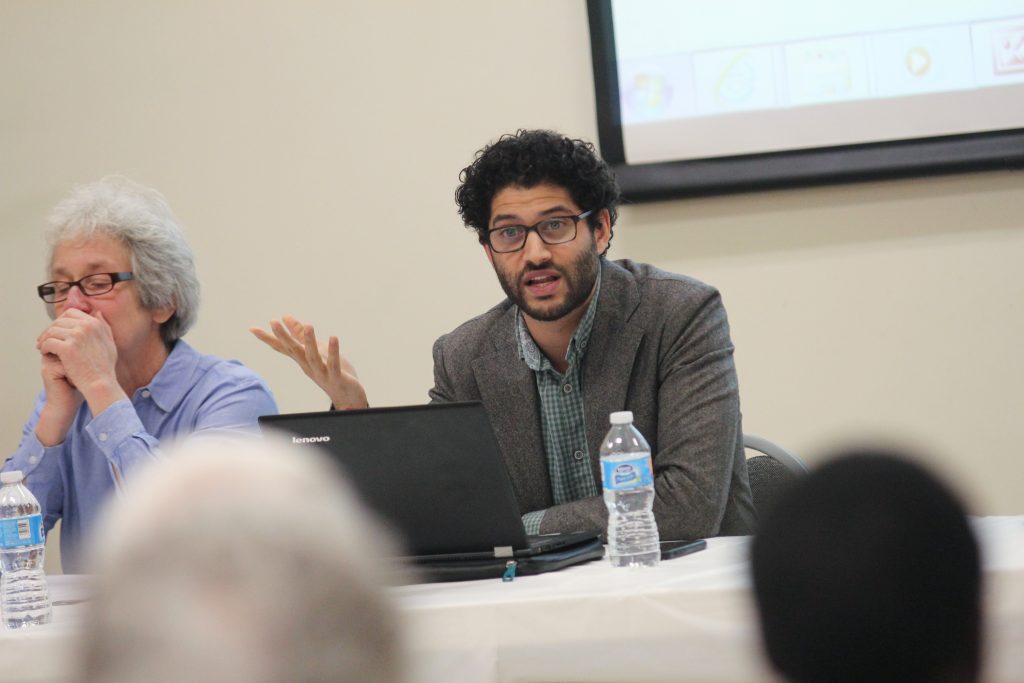
In response to President Donald Trump’s recent executive orders concerning immigration and refugee protocol, a panel of three local attorneys convened on Thursday evening to discuss the issues imposed by the policies and methods to deal with them.
The panel was held at the American Civic Association, a nonprofit immigration service organization located in Downtown Binghamton. Dara Silberstein, the executive director of the women, gender and sexuality studies department at BU, coordinated Thursday’s event, which was attended by over 50 community members and BU students.
The attorneys were Zaid Hydari, the executive director and co-founder of the Refugee Solidarity Network, a U.S.-based nonprofit organization that supports legal assistance programs for refugees in Turkey and carries out advocacy on refugee rights; Carmen Maria Rey, the deputy director of the Immigration Intervention Project at Sanctuary for Families, a role in which she helps to oversee the legal representation of thousands of immigrants; and Tamara Bloom, the managing attorney of the Community Events under the CUNY School of Law and a BU alumna.
Hydari explained that the United States’ acceptance of refugees is a symbolic gesture on an international level, and the Trump administration’s efforts to curtail immigration may implicate negative consequences. He emphasized that given the United States’ international influence and history of leading by example, the choice to not participate in accepting refugees sets a bad example and may emanate a level of selfishness.
“It is a largely symbolic step that the U.S. takes to share with the rest of the world,” Hydari said. “It has huge ramifications on a global level to simply say we will no longer participate in that program. That is effectively what the executive order has done, to basically say, ‘We are not participating in the program any longer for the next four months.’”
Rey noted that Trump has built on the notion of targeting and scapegoating immigrants. She said that Trump has expanded the definition of a criminal alien to cover all immigrants who have been arrested, even if that arrest did not lead to a conviction.
“The concept of a good immigrant and a bad immigrant allows the government to demonize a portion of our community and start with them, yet it never just stops with them is the problem,” Rey said. “First they come for the people with convictions and then they come for our children, and there is no way to stop it unless you stop it really early on.”
The panelists discussed the work of the Immigrant Defense Project, a nonprofit organization based in New York City which aims to protect and expand the rights of all immigrants. The organization provides information about what one’s rights are in the face of Immigration and Customs Enforcement officers.
For example, if an agent approaches an individual, the panel explained the first thing they should ask is “Am I free to go?” If the agents say no, one should use their right to remain silent and ask to speak to a lawyer. If agents begin to search an individual’s belongings, one should state, “I do not consent to a search.” The panel further stressed that one should not lie, show false documents, attempt to flee or resist arrest, as it may further aggravate the situation.
Maria Leira, a senior majoring in philosophy, politics and law, expressed that she attended the event in order to gain deeper insight on the recent happenings regarding Trump’s immigration policies.
“It’s frightening to make certain people feel excluded from a community and Trump has tapped into that dangerous territory,” Leira said. “If we can learn more about what’s happening now with the recent changes, it’s always beneficial to know why things are happening and perhaps learn methods we can use to combat these changes.”


